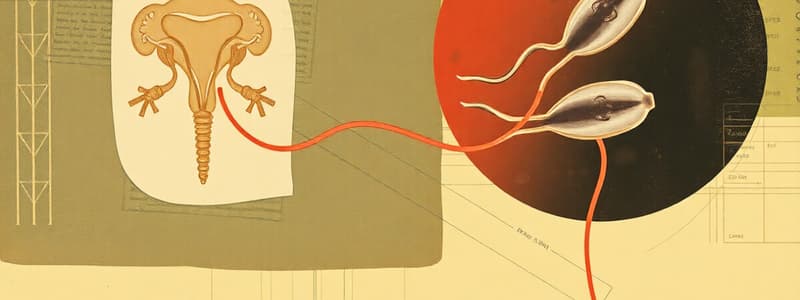Podcast
Questions and Answers
What is the primary outcome of the fertilization process?
What is the primary outcome of the fertilization process?
Which of the following processes occurs immediately after fertilization?
Which of the following processes occurs immediately after fertilization?
After fertilization, cleavage involves a series of what?
After fertilization, cleavage involves a series of what?
What is the significance of the blastocyst in embryonic development?
What is the significance of the blastocyst in embryonic development?
Signup and view all the answers
What critical role does fertilization play in reproductive biology?
What critical role does fertilization play in reproductive biology?
Signup and view all the answers
What initiates the process of fertilization?
What initiates the process of fertilization?
Signup and view all the answers
Which stage directly follows the fusion of sperm and egg?
Which stage directly follows the fusion of sperm and egg?
Signup and view all the answers
What is the function of cleavage after fertilization?
What is the function of cleavage after fertilization?
Signup and view all the answers
Which of the following correctly describes the sequence of events in fertilization?
Which of the following correctly describes the sequence of events in fertilization?
Signup and view all the answers
What is the primary end result of fertilization in terms of cellular structure?
What is the primary end result of fertilization in terms of cellular structure?
Signup and view all the answers
Study Notes
Fertilization
- Fertilization is the union of a sperm cell from a male and an egg cell from a female, forming a zygote, essential for sexual reproduction and embryonic development.
Sperm Transport
- After ejaculation, sperm travel through the female reproductive tract (cervix, uterus, fallopian tubes).
- Capacitation is a process sperm undergo in the female reproductive tract, enabling fertilization capability.
- Biochemical changes occur in the sperm's plasma membrane, allowing response to signals from the egg.
Interaction with the Egg
- The egg is surrounded by the corona radiata (granulosa cells) and the zona pellucida (glycoprotein layer).
- Sperm must penetrate these barriers to reach the egg's plasma membrane.
- Acrosome reaction: Enzymes released from the sperm's acrosome digest the zona pellucida.
- Sperm Binding: Sperm binds to specific egg receptors after penetrating the zona pellucida.
Fusion of Sperm and Egg
- Plasma membranes of the sperm and egg fuse, facilitating transfer of sperm's nucleus into the egg.
- Cortical reaction: Following sperm entry, the egg releases enzymes that modify the zona pellucida, preventing polyspermy (multiple sperm entry).
Formation of the Zygote
- Sperm and egg nuclei fuse, creating a diploid zygote (complete set of chromosomes).
- The zygote begins its journey down the fallopian tube towards the uterus for implantation.
Cleavage
- Cleavage is a series of rapid mitotic divisions without significant growth, forming smaller cells (blastomeres).
- The zygote divides into a multicellular structure called a blastula.
Stages of Cleavage
- Two-cell stage: Zygote divides into two equal-sized cells approximately 24-30 hours after fertilization.
- Four-cell stage: Zygote divides into four cells about 48 hours post-fertilization.
- Eight-cell stage: Zygote divides into eight cells around 72 hours after fertilization. Cleavage patterns can be radial or spiral.
- 16-cell stage (Morula): Continues cleaving to form a solid ball of cells.
-
Blastocyst formation: Fluid accumulation creates a hollow cavity (blastocoel) transforming morula into blastocyst.
- Inner cell mass (ICM): Embryo building block.
- Trophoblast: Outer layer enabling trophoblast implantation in the uterine wall.
Implantation
- Blastocyst reaches the uterus approximately 5-6 days after fertilization.
- Trophoblast invades the uterine lining, initiating a connection for nutrient exchange.
Studying That Suits You
Use AI to generate personalized quizzes and flashcards to suit your learning preferences.
Related Documents
Description
This quiz explores the intricate processes of fertilization and sperm transport within the female reproductive tract. It covers the critical stages from the union of sperm and egg to the biochemical changes necessary for successful fertilization. Test your understanding of these essential concepts in sexual reproduction.



